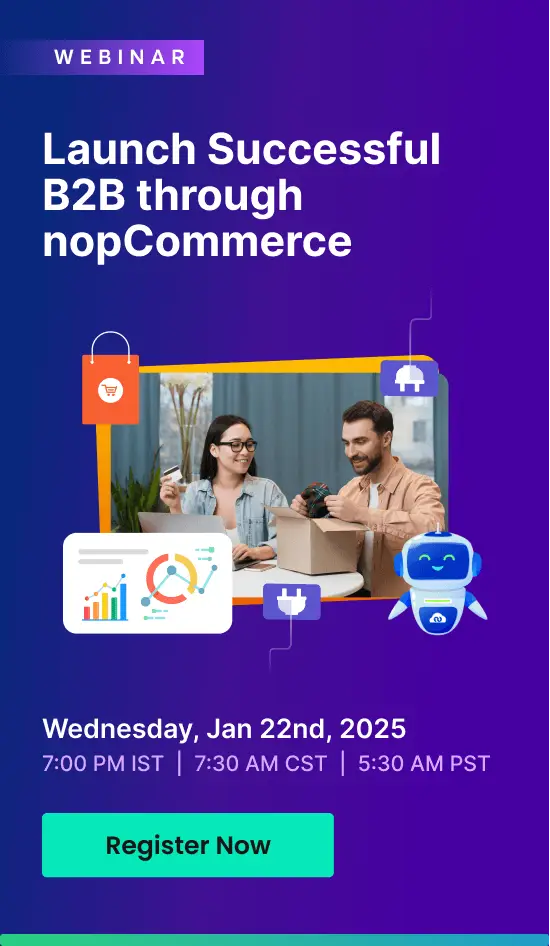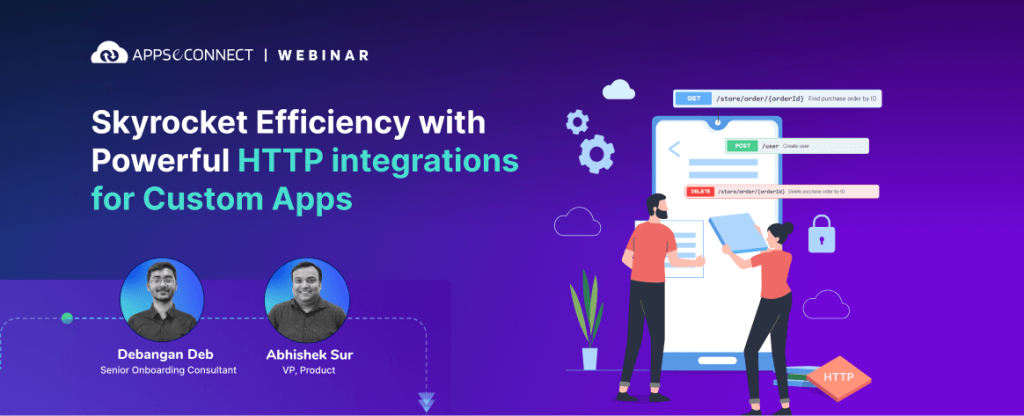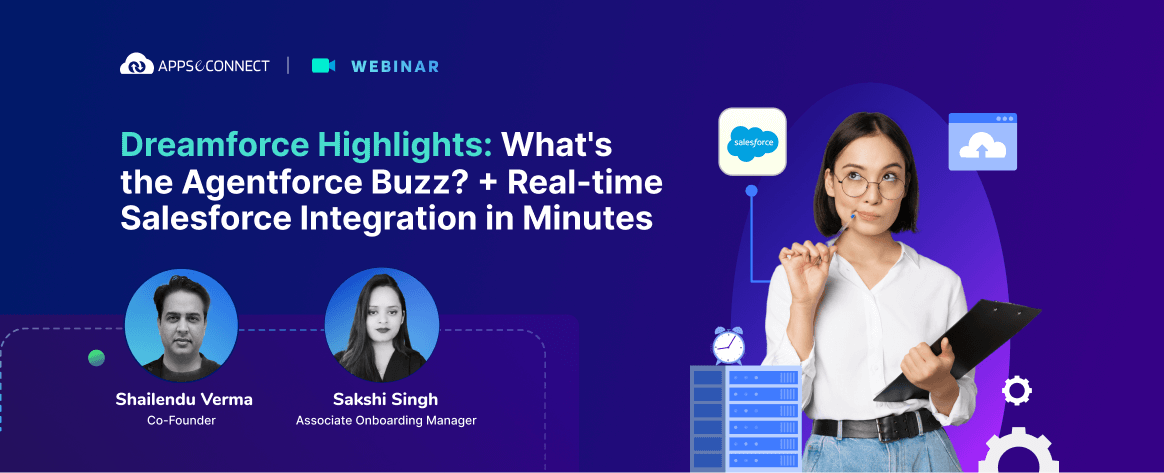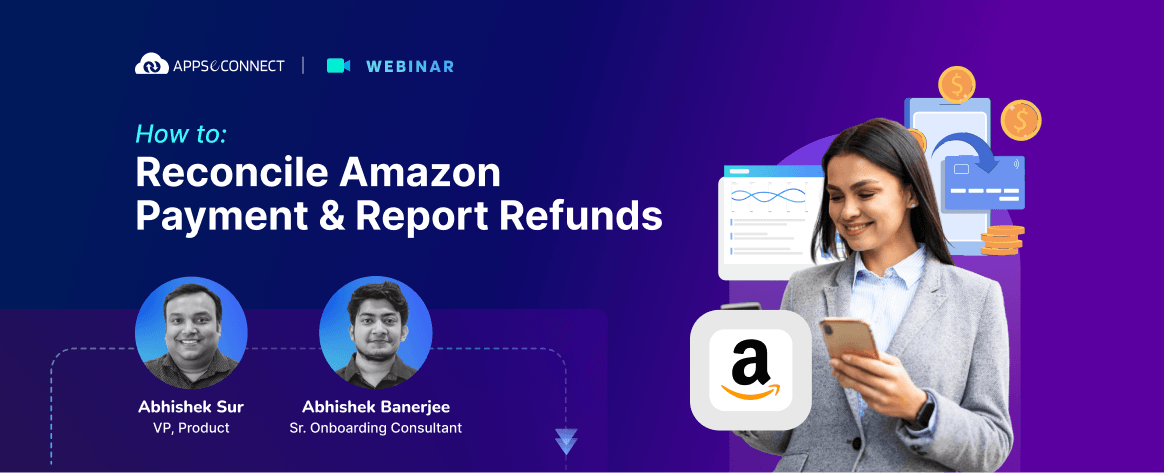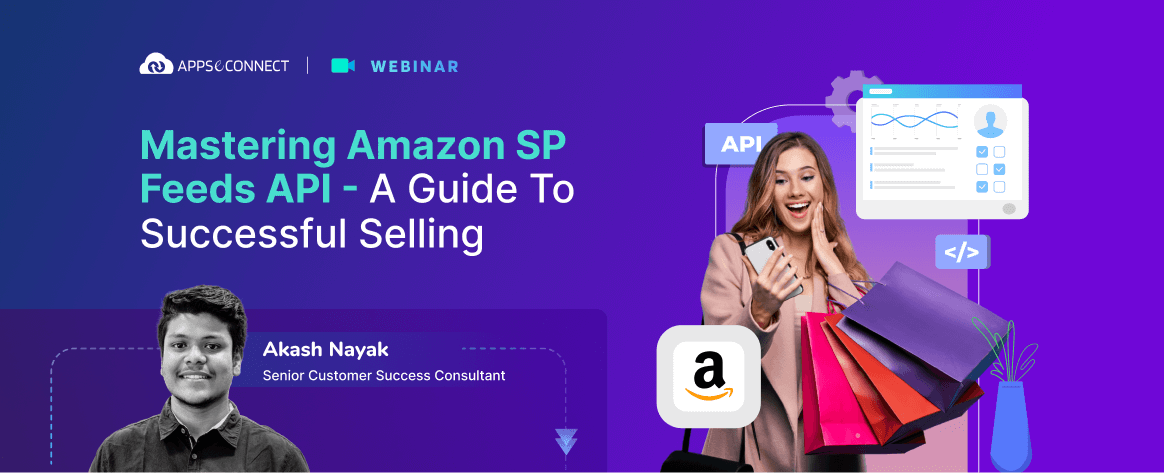The demand for diverse enterprise applications has surged in today’s tech-driven business landscape. From SaaS and cloud apps to eCommerce tools and ERPs, the online marketplace offers countless apps for different types of solutions. However, businesses often face challenges when seeking unique features not found in standard applications. In such cases, they develop their own custom applications for it. However, integrating such custom apps with other business applications is quite challenging, and most integration platforms also do not support HTTP integrations for private apps.
So if you’ve developed custom apps and are grappling with integration challenges, we are presenting an ideal solution in our recent webinar. Join us to discover how APPSeCONNECT simplifies the integration of custom apps with standard applications like ERPs and CRMs, so you can effortlessly create a unified tech stack. Read on for a preview of our webinar on HTTP integration for custom apps.
Webinar Overview – HTTP Integrations for Custom Applications
Even with many powerful enterprise software and applications in the market, there are plenty of companies that opt to develop their own custom apps for specific functionalities. In this recent webinar, we have explained how APPSeCONNECT users can register their custom apps on our integration platform and easily connect it with their ERPs, eCommerce platform, or other apps.
The webinar was presented by Abhishek Sur – VP of Product and Debangan Deb – Senior Customer Onboarding Consultant. Here’s a quick overview of the highlights and agenda of the webinar:
- Understanding the need to integrate private apps.
- How can APPSeCONNECT help with HTTP custom integration?
- Steps to connect private apps with APPSeCONNECT integration platform.
- Video demo showing the entire process of connecting private apps with HTTP integration.
After these points were covered in detail, the webinar was concluded with a Q&A section where viewers and attendees put forward their questions and doubts, which were expertly answered by our knowledgeable presenters.
You can watch a recap broadcast of the entire webinar below.
What are Custom Apps?
Custom apps are basically tailor-made applications that organizations build for their own use.
Take a simple example – you can find plenty of readymade chatbots that can be integrated to a website to automate customer support. But say a company develops their own chatbot application with certain features that are not available in other standard chatbots. Then it can be considered a custom or private app. And as the name obviously implies, these apps are only used by a single organization. Another example is how Shopify merchants can build their own custom apps in the platform.
So in short, it can be said that custom apps are tools or applications developed by businesses to be implemented only within the organization. The app development can be done in-house by the company’s own team of developers, or it can be outsourced to third-party agencies and developers.
Benefits of Custom Apps and HTTP Integrations
Custom app integrations offer several advantages tailored to meet specific business needs. Here are key benefits:
Tailored to Business Requirements
Such integrations are crafted to match the unique requirements of a business or application, ensuring a precise fit.
Enhanced Flexibility
Custom integrations provide greater flexibility, allowing businesses to adapt and modify the integration as needed. This agility is essential in a dynamic business environment.
Improved Functionality
Businesses can enhance the functionality of their systems by incorporating specific features and functions that might not be available in off-the-shelf solutions.
Greater Control
Businesses have full control over the development, implementation, and maintenance of custom integrations, ensuring alignment with their strategic goals.
Innovative Solutions
Custom app integrations allow businesses to implement innovative solutions that set them apart in the market, fostering a competitive edge.
Challenges in HTTP Integrations
Of course, integrating custom apps also poses many challenges, such as:
- The technical intricacies involved in HTTP integrations, such as API compatibility and data formats, can pose challenges for seamless communication between applications.
- Ensuring data confidentiality and protection against cyber threats requires robust security measures and protocols.
- Integration challenges often arise when cloud apps are not adequately connected to each other, resulting in fragmented data spread across different sections in the cloud.
- Poorly managed integrations may lead to maintenance challenges, impacting the overall reliability and performance of the integrated systems.
- And most importantly, there are little to no readymade solutions for integrations, as even most integration platforms do not support low-code or no-code syncing features for private apps.
However, these challenges can be overcome with APPSeCONNECT, as we are one of the leading iPaaS that supports seamless integration for your very own private apps. Let’s see how we offer a convenient solution for private app integrations.
APPSeCONNECT offers Seamless HTTP Integrations for Custom Apps
APPSeCONNECT is a low-code, intelligent and user-friendly integration platform as a service (iPaaS) which connects a wide range of ERPs, CRMs, eCommerce platforms, and other SaaS applications. After witnessing many businesses lean towards private apps for various features and purposes, we have also expanded our platform to allow end users to integrate their custom apps.
First of all, your private app must have API for the integration to be possible. After that, there are three main steps to execute HTTP integration for private apps:
Step 1: Identification
You must identify the database in their custom app and decide which data needs to be synced.
Step 2: Implementation
This is the stage where you set up and implement the integration by creating API requests, managing response structures, connecting endpoints with appropriate ProcessFlows and deploying the integration. Readymade tools are also available to connect endpoints with standard protocols like OData and REST API.
Step 3: Monitoring
Finally, you need to regularly monitor the integration to ensure that your workflows and data sync with custom apps work smoothly.
To help you better understand this process, we have shown all the steps in a live demo in the webinar, all the way from registering private apps and authenticating API to connecting them and deploying the workflows.
Conclusion
Custom apps, being tailor-made for specific organizational needs, offer several benefits, including tailored solutions, enhanced flexibility, improved functionality, greater control, and the ability to implement innovative solutions. However, the integration of custom apps presents challenges, such as technical intricacies, security concerns, and maintenance issues.
APPSeCONNECT offers a simple and highly effective solution, providing seamless integration for private apps and overcoming challenges through its low-code, intelligent, and user-friendly platform.
If you’re using custom or private apps for your business processes and need to integrate with your ERP or other enterprise applications, you can now easily connect them with APPSeCONNECT’s integration platform.
Other than that, we also offer various pre-built connectors for multiple applications and even design custom ProcessFlows for your business applications based on your specific business requirements. Seamlessly connect different platforms under a single, intelligent, and secure Business Process Automation platform through APPSeCONNECT and achieve exponential business growth.

